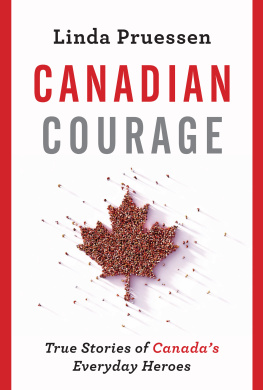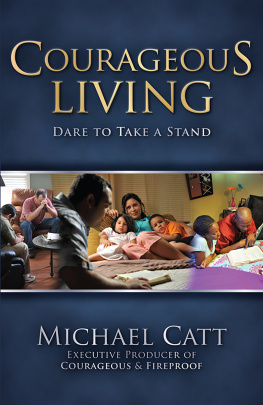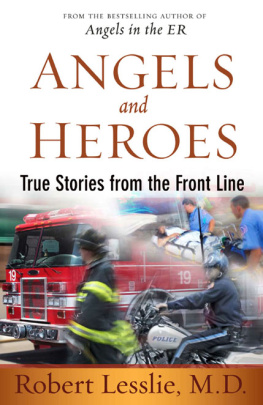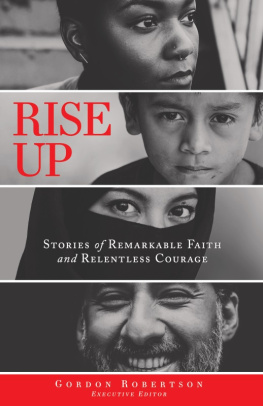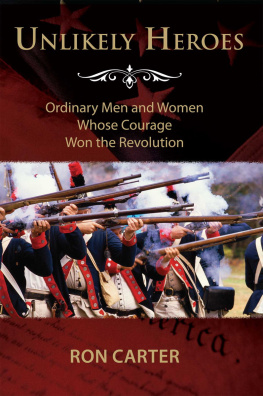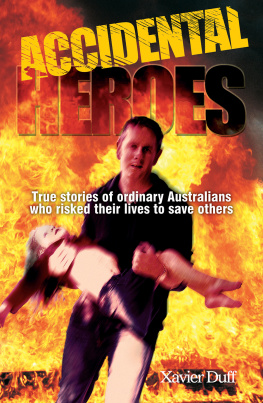YOU DONT HAVE TO LOOK far to find examples of Canadian courage; they are all around us, although not always in the places youd expect them to be.
When we think about courage, certain obvious images come to mind: members of the military charging into battle, law enforcement personnel helping civilians in danger; firefighters racing into a burning building. We think about the men and women who are willing to put their lives on the line for their country, or for others; about those remarkable folk who run toward danger instead of away.
This kind of courage is probably the easiest to call in mind. Its celebrated in war movies like 1917, or Passchendaele. Its addressed in the shelves upon shelves of true crime books in shops and libraries. And its recognized in newspapers and online, as the exploits of those who serve and protect in various ways are covered on a daily basis.
But you dont have to wear a uniform to be courageous, or have undergone training in emergency protocols or crisis management. Each of us is presented with opportunities to be courageous in our everyday lives. You can exhibit courage during a workday, when you risk getting swept down a mountain by an avalanche to save a co-worker who disappeared under a wall of snow and debrisas Trevor Smith did near Mayo, Yukon. You can show it in the dead of night, like Winnipeg native Les Lehmann, who stood up to an intruder to protect a group of students staying at his Dominican Republic resort. Or like off-duty lifeguard Rebecka Blackburn, from Leduc, Alberta, you can demonstrate courage when you brave the rushing waters of a river to save a drowning man. And take note: fully grown men and women dont have a corner on courage: Nova Scotias six-year-old Sophia LeBlanc had it in spades when she escaped an upside-down and partially submerged minivan and climbed a steep embankment to get help for her family in the aftermath of an accident. We cant forget our animal friends, either. Horses, dogs, even pigeons can get the job done. Just consider Sergeant Gander, the dog whose statue stands in Newfoundland and Labradors Gander Heritage Memorial Park in recognition of the sacrifice he made when he saved the lives of several Canadian soldiers in Hong Kong during the Second World War.
As it turns out, we can also exhibit courage without putting ourselves in harms way. Courage is demonstrated when we choose to fight injustice instead of turning a blind eye. This is exactly what Vishal Vijay did when, following a trip to India, he decided to work within his community of Oakville, Ontarioand then beyondto help children who werent as fortunate as him and his brothers. Its also what McGill student Tomas Jirousek did when he chose to stand for and with other Indigenous students to push for a change to the institutions troublesome name for its athletic teams.
And, finally, we can exhibit courage by overcoming adversity. Just ask Terry Fox, who pushed throughand far, far pasta cancer diagnosis to raise awareness and money and inspire a nation. Or Torontos Timea Nagy, whose own experience as a survivor of human trafficking compelled her to become an advocate for others and a voice for change.
When we read stories about people who have acted courageouslywhether in the face of danger, injustice, or adversitywere captivated. We may also find ourselves engaging in a bit of introspection. We wonder what it really takes to be courageous, and whether we have that secret ingredient somewhere in our own DNA. Faced with a similar situation, we ask ourselves, what might we do? Would we have the courage to run toward the danger and not away? Would we have the courage to stand up and fight injustice, instead of choosing not to see and not to act? Would we have the courage to overcome adversity and inspire others?
The remarkable Canadians you will meet here have exactly this kind of courage. Their stories are moving, thrilling, and, most of all, inspiring. In addition to having the secret courage ingredient in their DNA, they also have a superpower: the ability to make us want to be the very best version of ourselves.
When one door closes, another one opens.
GROWING UP IN AIRDRIE, ALBERTA, Ryan Straschnitzki had lots of dreamsmany of which revolved around hockey. Playing pond hockey with his friends and siblings, he imagined countless he shoots, he scores scenarios. He dreamed about working his way up through the ranks of the game he lovedplaying junior hockey, and then maybe making it to the NHL. He dreamed of donning Team Canadas iconic red-and-white jersey and lacing up his skates in the Olympics. He dreamed of bringing home a Stanley Cup, or a gold medal, or both.
In April 2018, as an eighteen-year-old playing for Saskatchewans Humboldt Broncos, Ryan was on the path to making those dreams come true. And then, in an instant, everything changed. Or almost everything. Some dreams, it turns out, can survive even in the toughest of circumstances.
RYAN HAS CLEAR MEMORIES OF the horrific crash that took the life of sixteen people and seriously injured thirteen others. It was late afternoon on April 6, 2018, and the Humboldt Broncos were on the team bus, making their way to Nipawin to face the Hawks in a semi-final playoff game. He remembers where he was sittingleft side, near the middleand the chatter of the guys around him as everyone tried to get into the right mindset for a win-or-go-home playoff game. He remembers texting his girlfriend, and the scream from the front of the bus that caught his attention just before everything went black. And he remembers waking up on the highway, his back against the body of the semi-trailer truck that had blown through a stop sign and slammed into the bus. He remembers a ringing in his ears, debris on the road, and his teammates all around him. My first instinct was to get up and try and help, but I couldnt move my body, he recalls. It was terrible.
By the time his parents arrived at Royal University Hospital in Saskatoon, Ryan was two hours in to a seven-hour surgery on his back. His injuries were catastrophic: four broken ribs, a broken shoulder blade, a punctured lung, bleeding on the brain, and spinal cord damage so severe it would leave him paralyzed from the chest down. After the surgery, Michelle and Tom sat by their sons bed, waiting for him to wake up and trying to come to terms with everything that had happened and what it meant for Ryans future. They were reeling, but their son, apparently, had already sorted a few things out. Eyes open, but still groggy, Ryan looked at his parents and apologized for not being able to move. Then he asked what seemed like a strange question. The PyeongChang Winter Olympics had wrapped up a little more than a month ago. Had Team Canada, he asked, won at sledge hockey? They hadnt, Tom told him; the gold had gone to the United States.
Tom has a crystal-clear memory of what came next: And then he looks and he goes, Im going to try out for sledge hockey, he says, noting that his son also planned to bring the gold medal home for Canada. Michelle and I, our eyes bugged out and went, Where did he come up with that?
Sledge hockey dreams or not, the days just after the crash werent easy. Ryan struggled to recalibrate, to adjust the expectations hed had for himself. The painphysical, emotionalwas intense. There were plenty of bleak moments, plenty of times he allowed himself to ask the why me and how come us questions that are so common in the wake of a personal tragedy. But he tried hard not to let himself sink into a dark place. The visitors helped. The week he spent in the ICU is foggy, but he does remember Justin Trudeau stopping in, and Don Cherry and Ron MacLean, and Sheldon Kennedy and Connor McDavid. Others came as well, and they all brought the same message: they were pulling for him; they believed in him and his teammates. He quickly came to realize just how much support he had from family, friends, and the community at large. The crash had captured the attention of the entire country. Across Canada, people were placing hockey sticks beside their front doors as a tribute to the players. A GoFundMe campaign raised $15.2 million in less than two weeks; a tribute concert raised another $428,000. The number of his fathers Twitter followers ballooned as the family used the social media platform to post updates about Ryans progress. People were invested in him, and he decided early on that he wasnt going to let themor the teammates hed lostdown.

